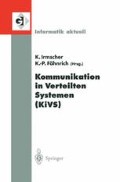Abstract
Woven codes are a family of forward error correction codes. They are constructed by combining several convolutional codes in such a manner that the overall code is again a convolutional code. This is a tutorial paper dealing with design aspects of encoding and decoding woven codes.
Woven codes are the counterpart in convolutional coding to the classical product code in block coding. Analogous to the product distance of product block codes, woven codes can be constructed with a large free distance, i.e., with a large asymptotic coding gain. This is important for systems that are designed to operate at extremely small output bit error probabilities.
It is shown how to introduce additional permutation to the woven construction such that the lower bound on the free distance of the original construction is preserved. Randomly generated and designed convolutional permuters are considered. This enables us to design codes that achieve large coding gains at moderate bit error probabilities. In case of large permutation lengths, this allows us to design systems that operate at code rates close the theoretical limit.
Access this chapter
Tax calculation will be finalised at checkout
Purchases are for personal use only
Preview
Unable to display preview. Download preview PDF.
References
Berrou, C, Glavieux, A., Thitimasjshima, P.: Near Shannon Limit Error-Correcting Coding and Decoding: Turbo-codes (1). IEEE International Conference on Com., Geneva, Switzerland (1993)
Heegard, C, Wicker, S. B.: Turbo Coding. Kluwer Academic Publishers (1999)
Hagenauer, J., Offer, E., Papke, L.: Iterative Decoding of Binary Block Codes and Convolutional Codes. IEEE Trans. on Inform. Theory 42 (1996) 429–445
Gallager, R. G.: Low-Density Parity-Check Codes M.I.T. Press, Cambridge, Massachusetts (1963)
Benedetto, S., Montorsi, G.: Serial Concatenation of Interleaved Codes: Performance Analysis, Design, and Iterative Decoding. IEEE Trans. on Inform. Theory 44 (1998) 909–926
Divsalar, D., Jin, H., McEliece, R. J.: Coding theorems for ‘turbo-like’ codes. 36th Allerton Conference on Commun., Control, and Computing, USA (1998)
Höst, S., Johannesson, R., Zyablov, V.: Woven Convolutional Codes I: Encoder Properties. IEEE Trans. on Inform. Theory 48 (2002) 149–161
Jordan R., Höst S., Johannesson, R., Bossert, M., Zyablov, V.: Woven Convolutional Codes II: Decoding Aspects. IEEE Trans, on Inform. Theory submitted 2001
Bahl, L. R., Cocke, J., Jelinek, F., Raviv, J.: Optimal Decoding of Linear Codes for Minimum Symbol Error Rate. IEEE Trans. on Inform. Theory 20 (1974) 284–287
Johannesson, R., Zigangirov, K.: Fundamentals of Convolutional Coding. IEEE Press (1999)
Höst, S., Johannesson, R., Zigangirov, K., Zyablov, V.: Active Distances for Convolutional Codes. IEEE Trans, on Inform. Theory 45 (1999) 658–669
Jordan, R., Pavlouchkov, V., Zyablov, V.: Maximum Slope Convolutional Codes. IEEE Trans, on Inform. Theory submitted 2001
Jordan, R., Höst, S., Johannesson, R.: On the Construction of Convolutional Permuters with Large Separations. IEEE Trans. on Inform. Theory submitted 2002
Viterbi, A. J., Omura, J. K.: The Principles of Digital Communication and Coding. McGraw-Hill (1979)
Jordan, R., Johannesson, R., Bossert, M.: On Nested Convolutional Codes and Their Application to Woven Codes. IEEE Trans. on Inform. Theory accepted 2002
Hübner, A., Jordan, R., Grill, J.: On permuters with second order separations between cascaded convolutional encoders. IEEE Intern. Symposium on Inform. Theory, Lausanne, Switzerland (2002)
Zyablov, V., Jordan, R.: On Woven Convolutional Codes with outer Warp and Unequal Error Protection. European Trans. on Telecommun. submitted 2001
Jordan, R., Höst, S., Zyablov, V.: Woven convolutional codes and unequal error protection. IEEE Intern. Symposium on Inform. Theory, Washington, DC, USA (2001)
Pavlouchkov, V., Jordan, R., Zyablov, V.: Some simulation results for woven convolutional codes with outer warp and two-level unequal error protection. 4th ITG Conference on Source and Channel Coding, Berlin, Germany (2002)
Baumgartner, B., Jordan, R., Zyablov, Z., Bossert, M.: On Active Euclidean Distances for Trellis Coded Modulation. IEEE Intern. Symposium on Inform. Theory, Yokohama, Japan submitted 2002
Author information
Authors and Affiliations
Editor information
Editors and Affiliations
Rights and permissions
Copyright information
© 2003 Springer-Verlag Berlin Heidelberg
About this paper
Cite this paper
Jordan, R. (2003). Woven Convolutional Coding. In: Irmscher, K., Fähnrich, KP. (eds) Kommunikation in Verteilten Systemen (KiVS). Informatik aktuell. Springer, Berlin, Heidelberg. https://doi.org/10.1007/978-3-642-55569-5_33
Download citation
DOI: https://doi.org/10.1007/978-3-642-55569-5_33
Publisher Name: Springer, Berlin, Heidelberg
Print ISBN: 978-3-540-00365-6
Online ISBN: 978-3-642-55569-5
eBook Packages: Springer Book Archive

